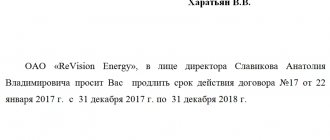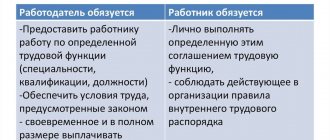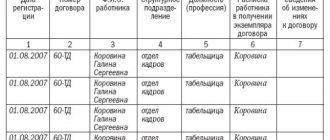An employment contract is a guarantor of strict fulfillment of the rights and obligations of its parties
The most common practice for many modern enterprises is the procedure for drawing up an employment agreement when hiring staff. An employment agreement is a document that acts as a guarantor of the strict fulfillment of rights and obligations between the manager and the worker.
The worker’s responsibilities include fulfilling labor functions and regulations existing in the company. The manager, in turn, undertakes to provide a job, an opportunity for development, and payment of wages.
Further in the article we will tell you for what period an employment contract is concluded, in accordance with what legislative acts. The procedure for drawing up the contract and its termination will also be described.
What can be the term of an employment contract?
Based on the norms given in the fifty-eighth article of the Labor Code of the Russian Federation, an employment contract can be drawn up for a long time, not specified by a specific date, as well as for a limited period. The first type of employment contract is called an open-ended one, while the second is a fixed-term employment contract.
A distinctive feature of this relationship is not only the length of the effective term, but also the main responsibilities and guarantees provided.
The conclusion of a fixed-term employment agreement is possible as a result of the introduction of temporary labor duties at the enterprise. For example, this may be a type of activity related to specific repair work, installation of equipment, or a temporary worker is hired in the absence of a full-time employee.
In this case, social guarantees are provided to the employee for the period worked, but they can also be initially fixed at a certain value.
According to legislative acts, it was determined that an employment agreement established for a certain period, which does not have a specific basis for reducing benefits or wages, is recognized as indefinite through the court with the assignment of a certain amount of compensation, since this violates the established rights of the employee.
The main differences between a fixed-term and indefinite employment contract
A fixed-term and an open-ended contract differ from each other in several respects. This:
- time period;
- the procedure for re-registration and changing the type of agreement;
- features of granting leaves and assigning a probationary period;
- other parameters.
Time period
The main difference is the time limitation of the agreement. The fixed-term contract must not only indicate the exact duration of its validity, but also the exact date of termination of the relationship. In this case, it is necessary to indicate the reason why the employer proposes to conclude such a document, as well as the condition upon the occurrence of which it will be terminated. For example, “replacing a temporarily absent employee.”
If a person is hired to perform a specific task or a certain amount of work, then this condition must also be indicated. However, the duration of the contract cannot exceed 5 years . If, after the expiration of the period specified in the “body” of the agreement, the employee continues to perform his job duties, then he is “automatically” hired on a permanent basis.
The procedure for re-registration and changing the type of agreement
Even if there is an agreement between the parties, an open-ended contract cannot be converted into a fixed-term one. You can do it in reverse! But for this the following conditions must be met:
- the agreement has expired, and the employee continues to carry out his labor activity at this enterprise;
- the condition of urgency is no longer relevant, but the person continues to work.
You need to draw up the agreement again and have the employee sign it.
Vacation and probationary period
This condition is relevant for those agreements whose validity period does not exceed 2 calendar months:
- a test for hiring cannot be established, according to Art. 70 Labor Code of the Russian Federation;
- For each full month worked, 2 full days of vacation are provided. According to Art. 291 of the Labor Code of the Russian Federation, these days can be replaced by monetary compensation;
- notice of termination of employment must be given 3 days before dismissal. According to Art. 292 of the Labor Code of the Russian Federation, this condition applies to both the employee and his superiors;
- unless a local act provides otherwise, a resigning employee is not entitled to severance pay.
If the agreement is concluded for a period of more than 2 calendar months, then these conditions become irrelevant. The exception is seasonal work for up to six months.
Other differences
There are other differences between these types of agreements. In particular:
- To enter into an agreement for a certain period of time, a clear justification of the reasons is necessary;
- a fixed-term contract ensures the fulfillment of strictly defined labor tasks within a specified period of time;
- an open-ended type of agreement ensures the constant implementation of all the employee’s labor tasks, which are specified in his job description.
The employer should be aware that if he offers an employee an agreement limited in time, but there is no legal basis for this, he may be subject to penalties.
Contract for an indefinite period
Indefinite employment agreement
An open-ended employment contract is an employment agreement concluded in the presence of long-term employment, which provides for a permanent basis in the main staff. An employment agreement drawn up for an indefinite period comes into effect after the signing procedure between the manager and the employee.
But another date may be provided, which is also previously discussed between the two parties.
Based on the sixty-seventh article of the Labor Code, the period for drawing up an employment contract in writing does not exceed three working days after the start of labor relations. This type of employment contract is concluded if the following grounds exist:
- free staff position;
- the presence of the employee’s desire to perform duties in accordance with the job description;
- employer approval of a new full-time employee.
The main difference between an employment agreement with a manager and the hiring of other specialties is that a strict definition of the contract as fixed-term or unlimited-term is necessary.
Basically, this point is prescribed in the charter of the enterprise. Consequently, if the document states the period of authority of the manager, then an agreement is drawn up for a specified time. In the absence of this clause in the charter, an open-ended agreement is drawn up.
Differences from civil law
Documents that seem similar at first glance have a number of differences. Let's look at them in the table:
| Fixed-term employment contract | Civil contract | |
| Type of work | A position has been identified that requires an employee to independently perform job duties. | The document specifies a list of services that the contractor must provide. There is no position as such. |
| The working process | The employee complies with the orders of his superiors in a timely manner. | The process itself does not matter, what is important is the required result. The customer may not control the work at all. |
| Routine | The work takes place in accordance with the company's regulations - according to the established regime, confirmed by the internal charter. | There is a start date for the activity and a planned end time. The contractor has the right to work at any suitable time - the main thing is that the work is completed on time. |
| Working conditions | The manager creates comfortable conditions for employees and provides them with all the necessary materials. | The contract may stipulate any conditions, but are not required. |
| Execution Process | It is assumed that the employee himself does all the work. | The Contractor has the right to involve any third party in performing the work. |
| Salary | The employee receives a monthly salary in a lump sum or in advance; the salary cannot be lower than the minimum wage. | Receipt of payment is negotiated individually - either the full amount after the work is completed, or an advance before the start of work. Payment does not depend on the minimum wage level. |
| Tax withholding | The accounting department withholds personal income tax, taxes to the medical and social insurance funds, as well as to the pension fund. | Personal income tax is withheld; taxes to the health insurance fund and pension fund may sometimes not be collected - for example, in case of a property rental agreement. If necessary, the contract includes a clause on insurance in the event of a work-related injury: then the tax is also paid to the Social Insurance Fund. |
| Guarantees from the employer | The manual provides a complete list of guarantees in accordance with the Labor Code. | There are no guarantees other than contributions to the pension fund. However, the period of contract work is included in the length of service. |
| Documentary support | A work record book is maintained for each employee, and an order for hiring and dismissal is created. Work experience is considered. | No documents other than the contract are provided. Work experience during work is not taken into account. |
| Employment | Registration takes place in accordance with the requirements for the employee, however, according to the Labor Code, there is a rule of equality by age, gender and nationality. | The employer may refuse to formalize the contract without giving reasons. |
Of the general features, only a limitation on the duration of work can be distinguished - in both cases, the date of employment and the date (or event) of completion of work can be specifically established. However, a fixed-term employment contract cannot be concluded for a period of more than 5 years, but a civil law one can.
Advantages of a contract for an indefinite period
The main advantage of an employment agreement for an indefinite period is, first of all, the guarantee of the absence of unlawful actions by the employer.
Also among the positive aspects of this agreement are the following points:
- Stable salary, permanent staff position.
- Complicated process of terminating an employment agreement at the initiative of the manager.
- The presence of bonuses from production, which are usually expressed in the receipt of an insurance policy, bonuses, and the opportunity to participate in various social programs.
Is it possible to change the type of contract?
Within the framework of judicial practice, repeated conclusion of a fixed-term agreement to perform the same work or the absence of significant reasons for concluding a fixed-term type of contract are grounds for its transfer to an open-ended form.
In cases where the term of a fixed-term agreement has come to an end, and both parties decide to continue the employment relationship, management enters into an additional agreement based on Art. 72 of the Labor Code of the Russian Federation, which changes the terms of the employment agreement and converts it into an open-ended one, and also issues a special order that clearly states the date of the change in the contract. A similar situation occurs if a temporary employee is transferred to a permanent position - the terms of the contract also undergo changes.
Labor legislation provides for the possibility of converting only a fixed-term contract into an open-ended one.
As for the content of the contract, which specifies its subject, the responsibilities of both parties and the general conditions, it is similar to an open-ended contract, with the only exception that a fixed-term contract always presupposes fixed terms for the labor process.
Disadvantages of a contract for an indefinite period
Disadvantages of an open-ended employment contract
When drawing up an employment agreement, regardless of whether it is a fixed-term contract or an open-ended one, an important component is compliance with all the norms of the labor code, otherwise the executed contract is considered invalid.
The main disadvantages of an employment contract for an indefinite period include the following:
- Strict compliance with the prescribed rules and internal regime at the enterprise.
- Presence of a trial period.
- Two weeks of work upon termination of the agreement, necessary for the employer to hire a new employee.
An employment contract for an indefinite period is concluded in the presence of a staffing table that requires the constant performance of production functions by certain employees.
Commentary on Article 58 of the Labor Code of the Russian Federation
1. The subject of an employment contract is labor as a human activity, which is a process that one way or another unfolds over time. It follows from this that the term condition is a condition of any employment contract.
There are two types of employment contracts: those concluded for an indefinite period and fixed-term. At the same time, the legislator proceeds from the fact that the main type is an employment contract concluded for an indefinite period; fixed-term employment contracts are an exception to the general rule. The fixed-term nature of an employment contract may be dictated by objective reasons (the nature of the work to be done or the conditions for its implementation) and, therefore, does not depend on the discretion of the parties to the contract. In other cases, an employment contract may be concluded for an indefinite period, however, in the presence of the circumstances specified in the federal law, an agreement between the parties regarding the establishment of the term of the employment contract is allowed (see Article 59 of the Labor Code of the Russian Federation and the commentary thereto).
The law establishes the presumption of a contract with an indefinite duration, i.e. the assumption that, unless the parties to the contract determine otherwise, the employment contract is concluded for an indefinite period. This presumption has several specific manifestations.
Firstly, if the employment contract does not specify the duration of its validity, then the contract is considered to be concluded for an indefinite period. This means that the parties, concluding an agreement for an indefinite period, may not include term conditions in the agreement at all; however, if the parties wished to enter into a fixed-term employment relationship, but did not stipulate this as a condition of the contract, the specified presumption of law applies.
Secondly, if none of the parties demanded termination of a fixed-term employment contract due to the expiration of its term, and the employee continues to work after the expiration of the employment contract, then the condition on the fixed-term nature of the employment contract loses force and the contract is considered concluded for an indefinite period. term. This wording does not mean that the fact of continuing work after the expiration of the contract is the conclusion of a new contract; on the contrary, the legislator proceeds from the fact that the parties initially did not intend to limit the contract to any period. Consequently, if the parties at the end of the contract decided to extend the employment relationship for an indefinite period, they should not formalize this decision in any way - the contract is considered concluded without a time limit from the moment of its conclusion.
The current practice of renewing an employment contract for a new term after the expiration of the previous contract should be declared illegal. It cannot be considered correct to establish, when concluding an employment contract, the condition that “if the term of the contract has expired, but neither party has demanded its termination, the contract is considered to be continued for a new term on the same terms.” Since the employee continues to work after the end of the contract, the contract is considered to be concluded for an indefinite period.
If the parties, if there are grounds for doing so, wish to limit the validity of the employment contract for a new (next) term, they must terminate the previous employment contract and enter into a new one, determining the duration of its validity.
At the same time, if it turns out that the reason that determined the fixed-term nature of the employment contract does not exhaust itself by the end of the current employment contract, the parties may, before the end of the contract, extend it for a certain period, formalizing such an extension with a corresponding additional agreement. In this case, the total term of the current contract must not exceed the deadline established by law.
2. By virtue of clause 2 of the commented article 58, employment contracts can be concluded for a period of no more than five years, unless otherwise established by the Labor Code of the Russian Federation and other federal laws. It follows from this that: a) the general maximum period for which an agreement can be concluded is five years; b) as an exception to the general rule, federal law may provide for a different deadline for the contract (Clause 2 of Article 58 of the Labor Code of the Russian Federation does not exclude the possibility of federal law limiting the term of the contract both within five years and beyond this period); c) the term of a specific contract is determined by the parties within the maximum period established by federal law.
3. When formulating a condition on the duration of an employment contract, it is advisable to indicate not only its validity period, but also its expiration date (this allows us to eliminate possible disagreements when terminating the contract due to the end of its term). However, situations are possible when it is difficult to establish not only the specific end date, but also the very duration of the contract term, for example, when concluding a fixed-term contract in connection with another employee (woman) going on maternity leave, as well as parental leave. At the same time, the exact completion date of the work for which the employee was hired is unknown. In such cases, the end of the employment contract is associated not with a specific date, but with a specific event. In the example given, a fixed-term employment contract may be concluded for the period of absence of the employee on the specified vacations. The employee’s departure from vacation, regardless of the specific date, is a circumstance that terminates the employment contract. Situations of this kind are taken into account in Resolution of the Plenum of the Armed Forces of the Russian Federation dated March 17, 2004 No. 2 “On the application by the courts of the Russian Federation of the Labor Code of the Russian Federation”: if a fixed-term employment contract was concluded to perform certain work in cases where its implementation (completion) cannot be determined by a specific date, such an agreement by virtue of Part 2 of Art. 79 of the Labor Code of the Russian Federation is terminated upon completion of this work (part 3, clause 14).
Another option for determining the term of an employment contract is provided for in Part 2, Clause 14 of the said Resolution: when concluding a fixed-term employment contract with persons entering work in organizations created for a predetermined period of time, the term of the employment contract is determined by the period for which such an organization was created. Therefore, termination of an employment contract with these employees on the basis of expiration of the employment contract can be carried out if the organization actually ceases its activities due to the expiration of the period for which it was created, or the achievement of the purpose for which it was created, without transfer of rights and obligations in the order of succession to other persons (Article 61 of the Civil Code). The total duration of the contract cannot exceed the deadline established by law.
4. As follows from the content of Art. 59 of the Labor Code, a fixed-term employment contract can be concluded if there are grounds determined by federal law. An agreement concluded for a specific period, in the absence of sufficient grounds established by the court, is considered concluded for an indefinite period. It is prohibited to conclude fixed-term employment contracts in order to evade the provision of rights and guarantees provided to employees with whom an employment contract is concluded for an indefinite period.
If it is established during the trial that there have been multiple conclusions of fixed-term employment contracts for a short period of time to perform the same labor function, the court has the right, taking into account the circumstances of each case, to recognize the employment contract as concluded for an indefinite period (Part 4, Clause 14 of the said Resolution of the Plenum of the Armed Forces of the Russian Federation) .
Thus, as follows from the Labor Code, the conclusion of a fixed-term contract is possible if there is: a) at least one basis specified in the federal law; b) an indication in the agreement of its validity period, determined by the parties within the general five-year period or the maximum periods established by federal law for certain types of agreement. In the absence of one of the specified conditions, the contract is considered concluded for an indefinite period.
Contract for a specific period
A distinctive feature of this employment agreement from a contract for an indefinite period is its pre-agreed end date. Thus, an employment contract for a certain time is drawn up to perform some work.
This could be seasonal work, replacing an absent worker, design work, etc. Based on the fifty-eighth article of the Labor Code of the Russian Federation, the maximum duration of a fixed-term employment agreement is five years.
Upon completion of the pre-agreed period of the employment agreement between the manager and the worker, further cooperation can be formalized.
The Labor Code does not stipulate the minimum time for which an agreement is drawn up. This is due to the fact that today there are a variety of labor services and needs for performing this or that work.
But at the same time, compliance with labor agreements that are urgent in nature is mandatory. Russian labor legislation prescribes the classification of labor agreements for a certain time into the following types:
- A contract concluded for a specific time. This applies, for example, to such positions as university rector, deputy, governor and others.
- An agreement for a relatively specific period of time. This applies to those enterprises and organizations that have created places for temporary work.
- An agreement of a conditional fixed-term nature. This paragraph applies to the case of temporary replacement of an absent employee.
When can a fixed-term contract be concluded?
Labor legislation strictly regulates the circumstances in which management must offer a new employee to enter into an employment contract with the company, the duration of which is limited to a temporary period. These conditions are specified in Art. 59 Labor Code of the Russian Federation. These include:
- temporary absence of an employee from his workplace. But on the condition that this job will be retained by him, in accordance with current legislation. The most common case is maternity leave. For example, one employee went on maternity leave, and another was temporarily hired in her place. When the maternity leave, she will return to her workplace, and the “replacement” can be fired or hired on a permanent basis;
- seasonal and temporary work, the completion of which will not take more than 2 months;
- sending an employee abroad to perform work duties;
- the enterprise’s need to expand, reconstruct or modernize equipment or operating facilities, provided that this work will be completed within a year;
- hiring an employee for an enterprise that was originally created for certain purposes and for a certain period of time;
- hiring a new employee to perform a specific task, while the deadline for completion and the task itself must be specified in the “body” of the contract;
- internship;
- other cases prescribed in Art. 59 Labor Code of the Russian Federation.
If the agreement between the parties is concluded for an indefinite period, then specific circumstances are not required.
Deadlines
If the company decides to enter into an open-ended contract with a specific specialist, the HR department will ask him to write a job application.
- a citizen temporarily performs the duties of another employee;
- the person is hired for a short-term job;
- the subject of the contract is seasonal labor;
- the employee is sent to work in another country;
- a person is hired in connection with a temporary expansion of production;
- a citizen is accepted into a company that is created for a certain period;
- an employee is accepted for an internship;
- a person has been elected to an elected position;
- the citizen is sent by the employment service for short-term work;
- the person is performing alternative civil service;
- other situations.
- Employment contract fixed-term or indefinite, which is better?
- What is an indefinite term employment contract?
- How to register that an employment contract is open-ended







